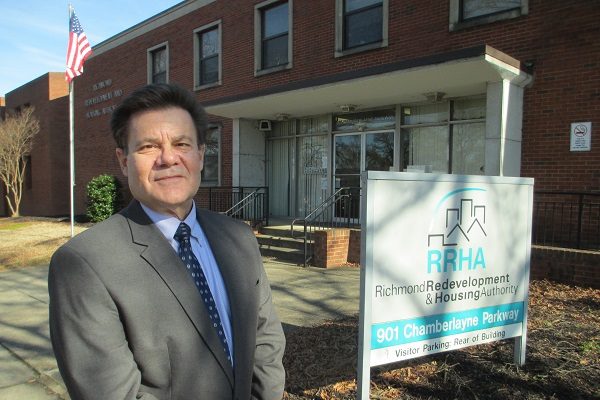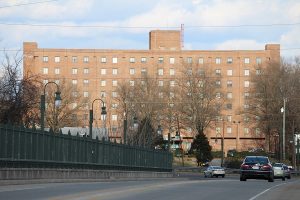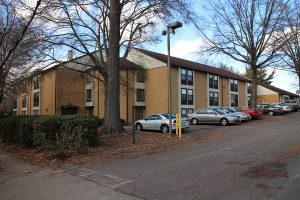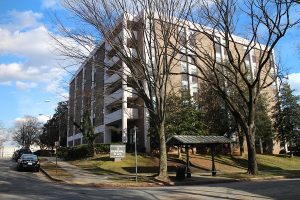As it looks to unload much of its land holdings in Blackwell, Richmond’s public housing agency is moving forward with two initiatives likewise aimed at developing its properties for private ownership.
The Richmond Redevelopment and Housing Authority is reviewing bids received from two requests for proposals it issued last fall – one for its planned Jackson Place mixed-use development in Jackson Ward, and the other for rehabs of 11 properties scattered across Richmond that total 553 apartments.
Orlando Artze, the RRHA’s interim CEO, said the efforts are aimed at preserving and increasing low-income and subsidized housing options in the city, while also converting existing public housing to opportunities for private ownership.
He said reductions in funding from the U.S. Department of Housing and Urban Development, which supplies the bulk of RRHA’s capital and operating funds, also necessitates the moves to enhance the authority’s properties, some of which – its public housing facilities in particular – are 75 years old.
“In public housing over the past 15 years, HUD has pulled back on its funding for both funds,” Artze said, describing the result as a gap between the authority’s available funds and its capital needs.
“This is not a sustainable system, because as time goes on, that gap gets bigger and bigger,” he said.
To help offset that gap, Artze said HUD is providing avenues for housing authorities to convert public housing to a project-based voucher program, in which rental income is transferred to a voucher that stays with a particular property. Authorities are allowed to try to secure funding for such projects from the private and public sectors, as it is doing with its RFP for the 11 scattered rehabs.
RAD rehabs
Issued in September, that RFP drew proposals from 10 developers, both for-profit and nonprofit and both local and out-of-area, Artze said. He said the authority board aims to make its selection of one or more developers in coming months.
The selected developer would work with the RRHA to rehab the properties, which would be owned by an LLC responsible for managing the sites. Artze said an expectation is that the selected developer or developers will in turn secure low-income housing tax credits and other funding sources to cover the 11 rehabs, which, at $55,000 per apartment for 553 units, are projected to total as much as $35 million.
The 11 properties to be rehabbed include five family housing properties totaling 204 apartments, and six senior housing properties totaling 349 units.
The family properties include the 64-unit Fulton Apartments at 1221 Denny St., the 52-unit Randolph Apartments at 300 S. Randolph St., the 40-unit Afton Avenue Apartments at 2201 Afton Ave., the 30-unit Stovall Place at 100 W. 24th St., and the 18-unit Bainbridge Apartments at 28th Street, Moody and Bainbridge streets.
The senior properties include the 105-unit Fourth Avenue Apartments at 1611 Fourth Ave., the 75-unit Lombardy Apartments at 700 S. Lombardy St., the 70-unit Stonewall Apartments at 1920 Stonewall Ave., the 50-unit Fox Manor Apartments at 18-A W. 27th St., the 25-unit Old Brook Apartments at 3900 Old Brook Circle, and the 24-unit Decatur Apartments at 1200 Decatur St.
The conversions to voucher-based housing is being done through HUD’s Rental Assistance Demonstration, or RAD, program. RRHA is using the same program for its three-project effort to provide replacement housing for residents of its Frederick A. Fay Towers, near Gilpin Court.
The under-construction Jackson Place, a $32 million mixed-use development by RRHA and Washington, D.C.-based Community Preservation and Development Corp., is one of the three projects planned to replace Fay Towers, the fate of which Artze said has yet to be determined.
The other two projects, likewise collaborations with CPDC, are the completed $11.4 million conversion of the old Highland Park Public School into 77 senior apartments, and the planned conversion of the former Baker School building next to Gilpin Court into 48 senior apartments. Artze said work on the Baker School project is targeted to start in May.
Jackson Place RFP
Next door to Jackson Place, RRHA is planning a comparable mixed-use development that’s the subject of the other RFP.
That development, likewise referred to as Jackson Place, would fill 3.4 acres in the block bordered by Second and Third streets between Jackson Street and the interstate with additional mixed-use buildings with housing above commercial space, along with a hotel with 100 to 115 rooms.
Rezoning was secured last year for the project, details of which remain in the works. A cost estimate has yet to be determined for the project, which RRHA has been working on with Pittsburgh-based Urban Design Associates.
Artze said two responses were received from the Jackson Place RFP. Artze said neither of those proposals came from CPDC, which told BizSense last fall that the hotel component could take the firm out of contention.
The project site is within the 80-block area proposed for a tax-increment financing district to support the Coliseum-anchored Navy Hill project, a proposed redevelopment of a 10-block area bounded by North Fifth, East Leigh, North 10th and East Marshall streets.
Artze said the proposed project could influence RRHA’s selection of a developer for its project, which could potentially be put toward fulfilling the Navy Hill project’s residential component of 2,800 new housing units, including 2,520 market-rate apartments and 680 income-based units.
Artze said RRHA anticipates selecting a developer for its Jackson Place project in March.
While those two processes play out, RRHA also is preparing to select a developer for a third RFP project: the sale of 96 single-family homesites in the city’s Blackwell neighborhood.
As it looks to unload much of its land holdings in Blackwell, Richmond’s public housing agency is moving forward with two initiatives likewise aimed at developing its properties for private ownership.
The Richmond Redevelopment and Housing Authority is reviewing bids received from two requests for proposals it issued last fall – one for its planned Jackson Place mixed-use development in Jackson Ward, and the other for rehabs of 11 properties scattered across Richmond that total 553 apartments.
Orlando Artze, the RRHA’s interim CEO, said the efforts are aimed at preserving and increasing low-income and subsidized housing options in the city, while also converting existing public housing to opportunities for private ownership.
He said reductions in funding from the U.S. Department of Housing and Urban Development, which supplies the bulk of RRHA’s capital and operating funds, also necessitates the moves to enhance the authority’s properties, some of which – its public housing facilities in particular – are 75 years old.
“In public housing over the past 15 years, HUD has pulled back on its funding for both funds,” Artze said, describing the result as a gap between the authority’s available funds and its capital needs.
“This is not a sustainable system, because as time goes on, that gap gets bigger and bigger,” he said.
To help offset that gap, Artze said HUD is providing avenues for housing authorities to convert public housing to a project-based voucher program, in which rental income is transferred to a voucher that stays with a particular property. Authorities are allowed to try to secure funding for such projects from the private and public sectors, as it is doing with its RFP for the 11 scattered rehabs.
RAD rehabs
Issued in September, that RFP drew proposals from 10 developers, both for-profit and nonprofit and both local and out-of-area, Artze said. He said the authority board aims to make its selection of one or more developers in coming months.
The selected developer would work with the RRHA to rehab the properties, which would be owned by an LLC responsible for managing the sites. Artze said an expectation is that the selected developer or developers will in turn secure low-income housing tax credits and other funding sources to cover the 11 rehabs, which, at $55,000 per apartment for 553 units, are projected to total as much as $35 million.
The 11 properties to be rehabbed include five family housing properties totaling 204 apartments, and six senior housing properties totaling 349 units.
The family properties include the 64-unit Fulton Apartments at 1221 Denny St., the 52-unit Randolph Apartments at 300 S. Randolph St., the 40-unit Afton Avenue Apartments at 2201 Afton Ave., the 30-unit Stovall Place at 100 W. 24th St., and the 18-unit Bainbridge Apartments at 28th Street, Moody and Bainbridge streets.
The senior properties include the 105-unit Fourth Avenue Apartments at 1611 Fourth Ave., the 75-unit Lombardy Apartments at 700 S. Lombardy St., the 70-unit Stonewall Apartments at 1920 Stonewall Ave., the 50-unit Fox Manor Apartments at 18-A W. 27th St., the 25-unit Old Brook Apartments at 3900 Old Brook Circle, and the 24-unit Decatur Apartments at 1200 Decatur St.
The conversions to voucher-based housing is being done through HUD’s Rental Assistance Demonstration, or RAD, program. RRHA is using the same program for its three-project effort to provide replacement housing for residents of its Frederick A. Fay Towers, near Gilpin Court.
The under-construction Jackson Place, a $32 million mixed-use development by RRHA and Washington, D.C.-based Community Preservation and Development Corp., is one of the three projects planned to replace Fay Towers, the fate of which Artze said has yet to be determined.
The other two projects, likewise collaborations with CPDC, are the completed $11.4 million conversion of the old Highland Park Public School into 77 senior apartments, and the planned conversion of the former Baker School building next to Gilpin Court into 48 senior apartments. Artze said work on the Baker School project is targeted to start in May.
Jackson Place RFP
Next door to Jackson Place, RRHA is planning a comparable mixed-use development that’s the subject of the other RFP.
That development, likewise referred to as Jackson Place, would fill 3.4 acres in the block bordered by Second and Third streets between Jackson Street and the interstate with additional mixed-use buildings with housing above commercial space, along with a hotel with 100 to 115 rooms.
Rezoning was secured last year for the project, details of which remain in the works. A cost estimate has yet to be determined for the project, which RRHA has been working on with Pittsburgh-based Urban Design Associates.
Artze said two responses were received from the Jackson Place RFP. Artze said neither of those proposals came from CPDC, which told BizSense last fall that the hotel component could take the firm out of contention.
The project site is within the 80-block area proposed for a tax-increment financing district to support the Coliseum-anchored Navy Hill project, a proposed redevelopment of a 10-block area bounded by North Fifth, East Leigh, North 10th and East Marshall streets.
Artze said the proposed project could influence RRHA’s selection of a developer for its project, which could potentially be put toward fulfilling the Navy Hill project’s residential component of 2,800 new housing units, including 2,520 market-rate apartments and 680 income-based units.
Artze said RRHA anticipates selecting a developer for its Jackson Place project in March.
While those two processes play out, RRHA also is preparing to select a developer for a third RFP project: the sale of 96 single-family homesites in the city’s Blackwell neighborhood.






